Graham Reid | | 3 min read
Gorillaz: Tomorrow Comes Today
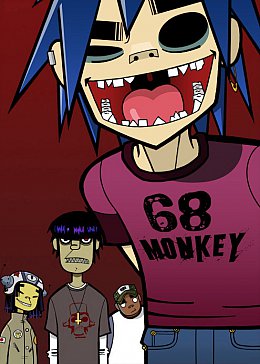
When I met Damon Albarn in London many
years ago things were looking good for his band Blur: they'd
previously scored a minor hit with There's No Other Way
(heavily borrowed from Syd-era Pink Floyd which he cheerfully
admitted), it had taken them to America, and their debut album
Leisure went to number two on the UK charts.
Their second album Modern Life is
Rubbish had just arrived and was steeped in an Englishness that
was a banner-waver for Britpop.
Albarn was cocky and articulate. After
the interview I said to someone even if Blur didn't go far Albarn
certainly would. That Blur knocked out seven albums before the
departure of guitarist Graham Coxon was further than I thought (I
would have given them four, tops) but their albums were increasingly
interesting . . . and these days they are considered an
“alternative” rock band rather than the mainstream pop one they
were in the early 90s.
Their turning point was their
self-titled album of '97 (most bands have a self-titled debut so this
was them announcing a rebirth) which was more ragged and alt.rock
than the four which preceded it. Blur was closer to American
indie rock than the dying end of Britpop (Oasis' last great blast Be
Here Now came out later that year but sounded indulgent and
bloated).
Blur's 13 (from '99) and Think
Tank ('03) saw them moving even further from the axis of the
British pop tradition (Beatles/Bowie/Kinks) which Albarn had been
championing. They were defiantly different: there were loops and
samples, Coxon pursuing the alt.rock direction, Albarn's listening
habits gravitating to world music, the lyrics and sound darker . . .
When Coxon quit at the start of Think
Tank sessions you knew Albarn would take the opportunity to
reinvent himself. He'd already co-founded the imaginary band Gorillaz
(their debut sold over eight million copies) with a fluid line-up,
and had recorded Mali Music with various African musicians.
For Albarn, Blur had just been the
stepping stone into a world where he could explore his own musical
interests. That was proven when he hooked up with former Clash
bassist Paul Simonon, Gorillaz guitarist Simon Tong and African
drummer Tony Allen (of Fela Anikulapo Kuti's Afrobeat outfit) as the
band The Good, The Bad and The Queen.
Then he bounced back to more Gorillaz
projects: one a stage play based on the Chinese character Monkey,
another the multi-media touring project and concept album Demon
Days, and this year the all-star concept album/videos for Plastic
Beach.
Against the odds, Albarn and Coxon
reconciled and Blur headlined at summer festivals in 2009. When I
spoke to him Albarn said, “I had all the advantages of the
educated, white, middle-class person with a slightly more
left-of-centre than conservative background. I had a good musical
education and love Kurt Weill, Gershwin, Noel Coward and those
people. I was lucky at school because I had a good teacher and my
parents were involved in music and theatre . . . I can’t write
about the depths of misery because I’ve never felt it.
“In some ways, I’m perhaps
disadvantaged in that. Unless something profoundly dark happens to
me, I’m never going to reach inside myself, so I have to sing about
kitchen sinks.”
Along the way his split with Justine
Frischmann certainly gave him material for gloomier songs – but
that's largely been true: he's had advantages, and used them.
Blur, Gorillaz, Mali Music, The
Good The Bad and The Queen . . .
Quite a journey. Everything – and the
kitchen sink.
And the big-concept Gorillaz show comes
to the Vector Arena in Auckland on December 21, 2010.
BLUR AND BEYOND: THE ALBARN BASICS
Blur, Parklife
(1993): A classic Britpop album which celebrates thing English
with wit, and songs which stick like a toffee-apple to your Modern
Life is Rubbish tee-shirt.
Blur, Blur (1997):
Their previous album had been titled The Great Escape, but it
was more fitting here as they loosened the ties to Mother England's
apron and edged towards US-framed alt.rock.
Blur, 13
(1999): A darker, more dense and demanding Blur but one which
rewards even now.
Gorillaz, Gorillaz
(2001): The genre-busting debut which hauled in dub, hip-hop,
indie rock, Latin sounds – and brought Del tha Funkee Homosapien
back from the wilderness. Who could have predicted that?
Gorillaz, Demon Days
(2006, DVD): The cartoon band comes to life on stage in
Manchester with guests Neneh Cherry, De La Soul, Ike Turner and many
others.
The Good, The Bad and The Queen, The
Good, The Bad and The Queen (2007): If Gorillaz was
Albarn disappearing behind a cartoon character this was the alter-ego
enjoying a mashing-up semi-supergroup.
Blur: No Distance Left to
Run (2010, DVD): Beautifully shot doco on their
reunion with rehearsals, reminiscences and stunning live footage of
their resurrection. See here.

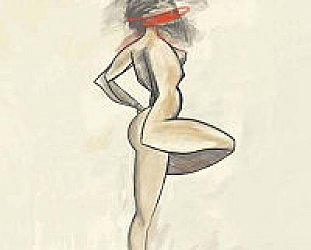

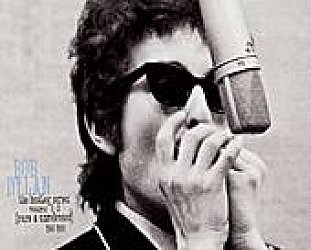
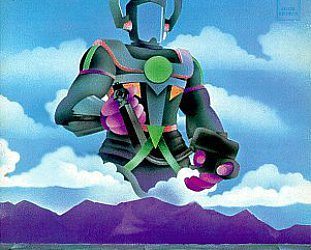
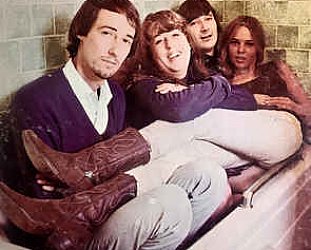

post a comment